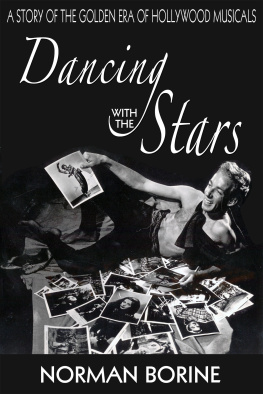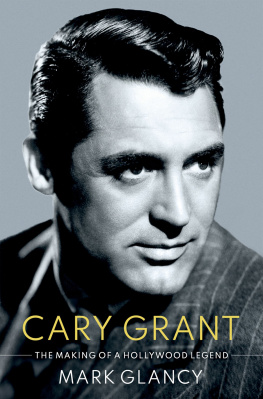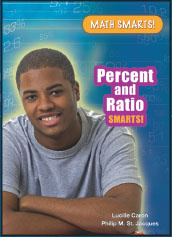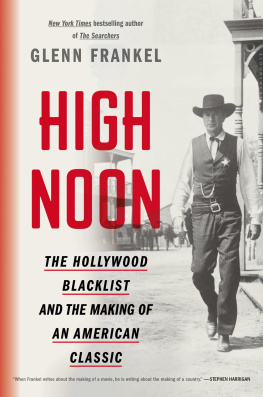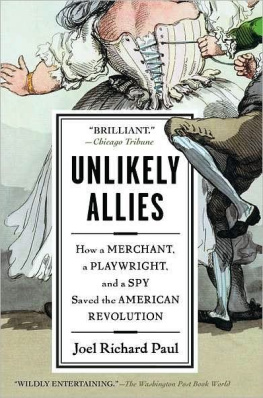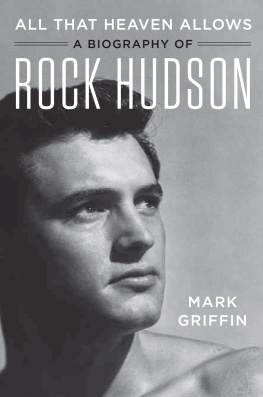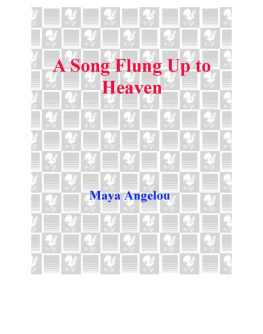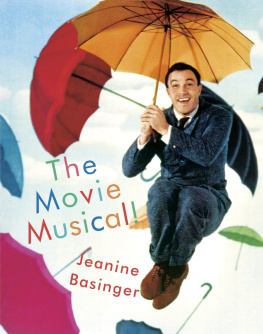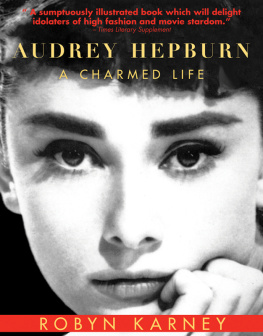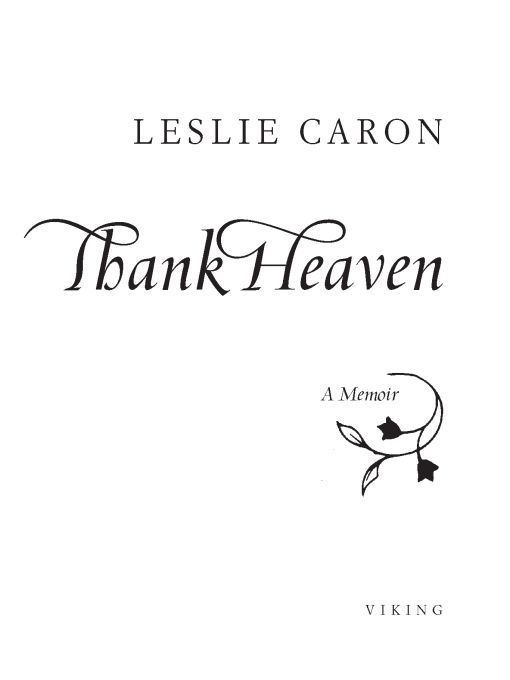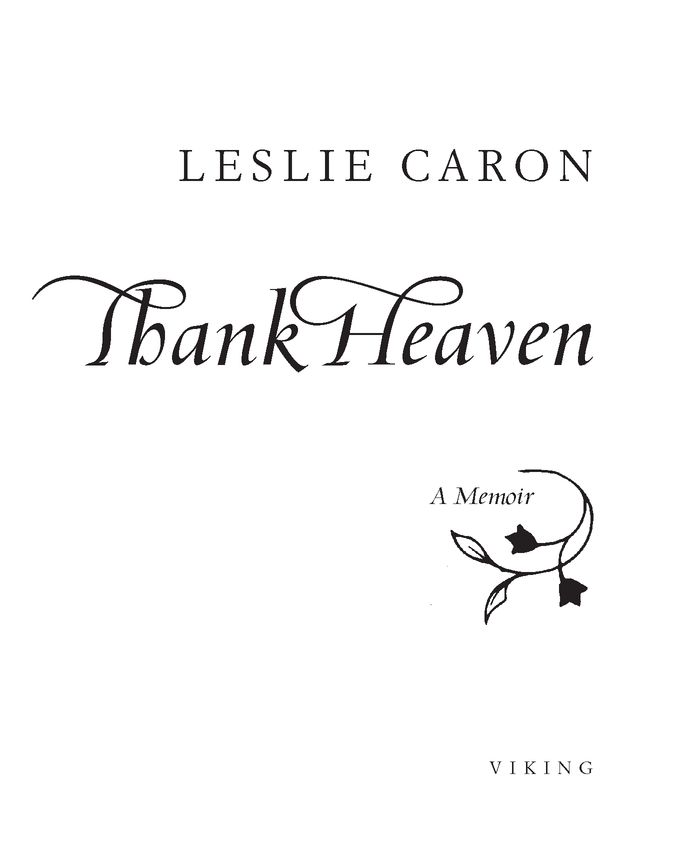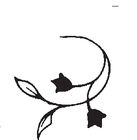Table of Contents
ALSO BY LESLIE CARON
Vengeance
To Christopher and Jennifer
ACKNOWLEDGMENTS
My thanks first go to Bruce Benderson, who, after giving me the initial push, was patient enough to teach me a few basic rules (give us details, give us dialogue, dont be shy of emotion) and a lot of encouragement. Next my thanks go to Cathy Nolan, who helped me put early events into perspective and taught me some necessary disciplineand to Judy Fayard, always there with a bagful of rich American expressions. My thanks should most particularly go to my friend Steven Englund, who recommended me to his literary agent, Georges Borchardt, who in turn believed I was capable of carrying this work through to its conclusion. Distinguished and supportive, he provided the encouragement that was my walking stick throughout. My brother, Dr. Aimery Caron, the family historian, gave me a precious rsum of our family tree. Thanks go to my writer friends Jacques Fieschi and Bernard Minoret, who insisted from the start, Yes, you can. To my friend the architect Alberto Ponis, who said, You must! To my daughter, Jennifer Wilhide, who brought me the angle of her childhood recollections. To my very good friend Jack Larson, who remembers in detail the eccentricities and follies of Hollywood in the fifties. To Lorna Birch, who restrained me from certain excesses. To my friend the writer Priscilla English, for her support, as well as to my newer friend, the producer Neal Baer, for his generous backing; to my good friend Nancy Lindermeyer, for her expert advice; and to my son, my friends, and my ex-lovers and ex-husbands, who brought little pieces of mosaic to the whole panorama.
Finally my gratitude goes to my American editor, Rick Kot, who knew how to say kindly, Nearly totally perfect. Here are five pages of corrections. And to my British editor, Jeremy Robson, who has an uncanny mind for forgotten details. They were both right (nearly) every time, and Im forever grateful for their solicitude and enthusiasm.
AUTHORS NOTE
Writing ones autobiography is a huge undertaking, one that took me decades to dare contemplate. First of all, during youth ones life is so full of surprises, fireworks sparking off in so many directions, that one waits with bated breath for a clear sense of whats going on. For a minute, life appears with perfect clarity, but the line is a little shortLet us wait for more to happen, one thinks. Much more happens, of course, until with the mature years, life starts to gather momentum, like a bicycle without brakes gone wildthe famous fleeing forward. I was past seventy when I suddenly realized, What am I waiting for, nows the timeor never!
Why should I write at all, I ask myself. Yes, of course, there is nothing forcing me to reveal what is, after all, only a personal experience, considering that Im a very secretive person who shuns self-revelation. Here was the real conflict: Should I hide like a crab under a stone and go out without a ripple, or testify and bear witness? Perhaps it is my old habit of storing everything, recycling things if I can, passing on the treasures I have accumulated, that compelled me finally to leave a trace of the remarkable people I have known and events I have experienced.
It took a friend of mine, Bruce Benderson, who asked for permission to write a book about my life, to get me going. I was more than willing to let someone else do the dirty work. Bruce requested that I keep two weeks free in May 2007, during which he would question me at length, I would reveal all my secrets into a Dictaphone, and he would then interpret my recollections and write his version of my life. Fine. But when the time came, because of his own busy schedule at the release of his latest book, whole days shrank into shorter and shorter hours. What to do with the remaining free time? I started to write on my own. After a week I had blackened ten pagesa week later fifteen. Not all good, of course, but I was on my way even if it made me dizzy at times.
The experience was fascinating but, at first, far from satisfactory. I found that the early drafts were either frivolousone does try to please ones imagined readeror overdramatic, to create an effect. The temptation to settle old scores also demanded several rewrites. I came to the conclusion that with enough humor you can say just about anything. I was tempted to skip embarrassing moments until my editors observed, There is a link missing here. Tell us why this or that happened. Lets face it, there is no more useless exercise than to falsify ones biography. It is difficult enough to have a clear recollection of people and events, memory being selective, partial, and biased, but why hide the odd embarrassing moments?
My perception of an event was often recalled through small, insignificant details, but thats how it works with me, and these may be interesting years later. To my great surprise, though I thought that I had very poor memory regarding certain events, things did come back without the help of any notes or journals, things that were important, to me at least. It seems that all of ones life is filed away in the many folds of the brain, ready for a replay. Of course I consulted newspaper clippings to confirm the dates, some details were recalled by good friends or members of my family, and occasionally Google and Wikipedia helped to freshen my recall, for souvenirs are filed away in a disordered jumble. The remote often seemed near, and the close-by seemed to fade in the distance. Not surprisingly, the dark years were just as painful to recollect as when they actually bogged me down, and the good times filled me with the same joy as they originally had.
Writing Thank Heaven took a good deal of courage, for its not easy to look at what youve made of this immense gift that life is. If I ultimately wrote this book for my children, Ill be glad if it interests, amuses, and even inspires my readers. But Im the first whod like to know who I am, and insight is not at all clear until the last page is written.
Paris, May 2009
Childhood
In my early childhood, in the 1930s, before the Second World War, my father, mother, my brother Aimery, and I lived on the top floor of the private mansion that my French paternal grandparents built in Neuilly, an elegant suburb of Paris facing the river Seine. The architecture was of the best art deco style. My grandparents were, it seems to me, extremely rich and eager to be part of everything that was modern. Perhaps all bourgeois in France lived on such a scale then. I have no point of reference.
My French grandmothers grandfather, Pierre Armand Dsir Savalle, born in 1791, was a civil engineer who had invented and patented the distiller called la Colonne Savalle (often referred to as the fractional distillation column), used ever since for producing alcohol as well as gasoline and other liquid products. He made a sizable fortune, as can be imagined.
My French great-grandfather, Ernest Adolphe Caron, after having been an eminent lawyer in the civil appellate court, turned to politics and was named president of the municipal council in Paris, which amounted to being the mayora title that did not exist in those days. Accumulating prestigious functions, he also became the president of the general council of the Seine Department. The list of his decorations, French and foreign, could cover half a page. Among his perks were free boxes at all the Paris theaters, the opera house, nightclubs, and about six racetracks. He was, of course, prominent in high societya film shot in 1900 displays a portly gentleman with Edward VII mustachios, presenting the beauty queen of that year during a grand ball at the town hall. Newspaper clippings of the day also show his wife climbing Mont Blanc, one of the first women to do so. During the Second World War, we found and opened a trunk belonging to her, full of opera glovesdozens of pairs, practically new, white, cream, or pale pink, soft as babys skina useless but luxurious treasure in those lean years. They were distributed among all her descendants. I tried to make a pair of sandals out of one pair by nailing the fine suede to an ill-fitted piece of cork. It didnt work.


